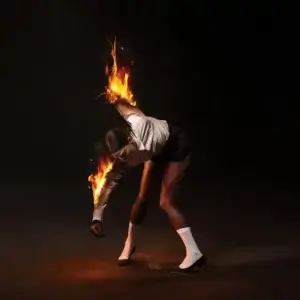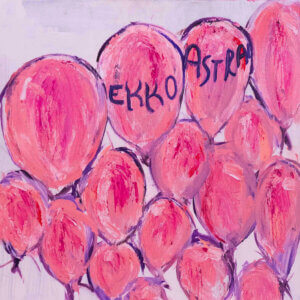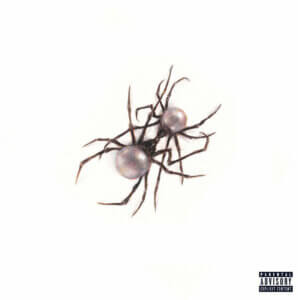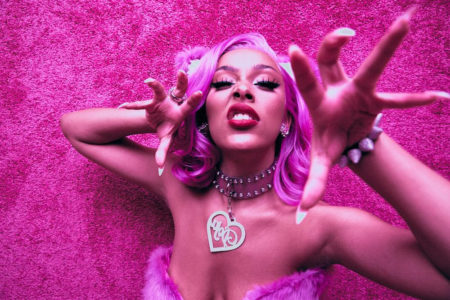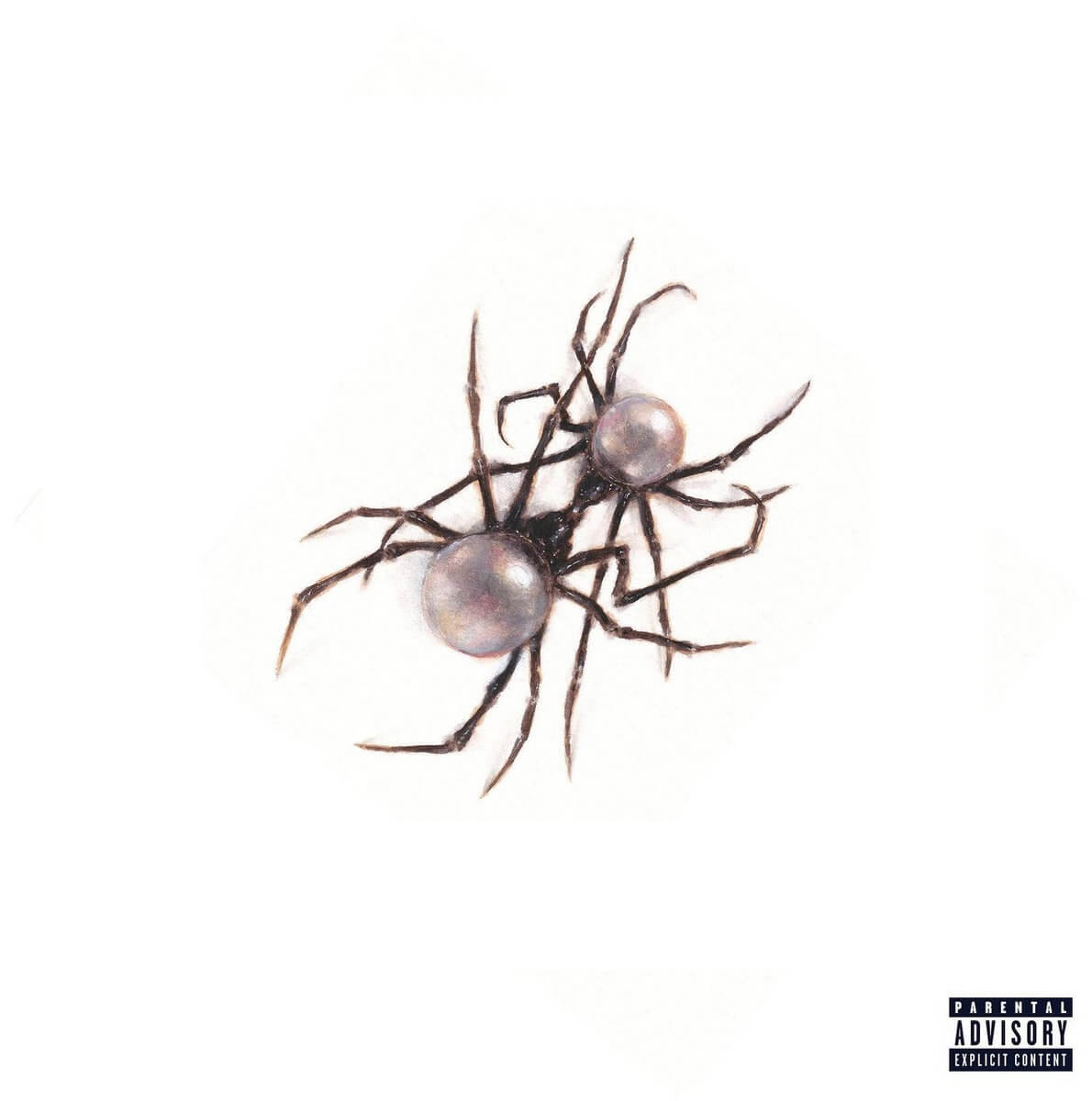
6.4
Scarlet
Doja Cat
There’s likely no other musician performing at the moment more polarizing than Doja Cat.
Propelling to stardom through memes, joke songs, and an online presence her PR team likely relishes and laments at the same time, the young rapper had an intense year after refusing to say she loves her fans, responded inappropriately to allegations that her boyfriend had groomed young fans, it’s impossible to find someone that doesn’t have an opinion about her.
In May, Doja Cat declared that she’s breaking out of the pop barriers she imposed on herself, and effectively abandoned her previous albums: “planet her and hot pink were cash grabs and yall fell for it,” she said on Twitter. “now i can go disappear somewhere and touch grass with my loved ones on an island while yall weep for mediocre pop.” Her first two albums may have been ‘cash grabs,’ produced in order to garner attention, but to frame her fans as inattentive consumers, lambasting them for liking her music, is just bizarre. A similar random bullet towards her listeners happens in “Love Life”, which is grateful to where her life is at. “I love it when my friends call back, I love showin’ them brand-new tracks,” she starts. Okay, that’s great! Then: “Y’all never had no friends like that.” Rappers flex how they’re more rich and famous than normal people all the time, but, making fun of them for… Having no friends?
Anyway, the ‘mediocre pop’, in question, wasn’t really mediocre — hits like “Kiss Me More”, “Say So”
, “Streets”, and “Need To Know” caused Doja to rise because they were legitimately good. But it’s confusing, then, after that comment, that the next single released is “Paint the Town Red”, a viral bop that relies on much of the same production and rap style she’s used before. “Bitch, I said what I said,” she opens, “I’d rather be famous instead,” which seems to be a direct follow-up to her comments. People rushed to hear her new song to see how it’d be different from her past, and they were greeted with a lousy response: “I let all that get to my head.” Is it really the best she can do, or is it just one large prank, a publicity stunt, again?
Much of the album relies on the same formula — the entire first half is unassuming easy rap tracks that don’t differ much from her previous work. The biggest switch-up is “Demons”, which is in response to allegations that she’s sold her soul to Satan. A clever marketing trick (along with its well-executed video), but the hardcore beat is incongruous to half-baked raps: “We are enemies, we are foes, who are you? And what are those? You are gross,” she says. There’s also an interesting idea in “Fuck The Girls”, where she eschews female camaraderie, saying they can be disloyal: “They ain’t with me, then they with me, so fuck the girls.” In an era of Lizzo-branded uplifting empowerment, this is at least one valuable take.
The album picks up massively around the halfway point, with “Agora Hills”, one of her best songs yet. She uses her real voice, finally, not plastered with giggly baby-voice, to rap about a relationship she’s fine with going public. “Kissing and hope they caught us, I wanna show you off,” she sings, in an e-girl early 2000s valley accent that just works. “Hope you can handle the heat, put your name in the streets, get used to my fans looking at you,” she sings. The romance continues on the next tracks, “Can’t Wait”, an ode to devotion, and “Often”, an ode to sex. “I just wanna watch us again and over again,” she says of an intimate moment in the latter, “Superstar, professional.” They’re both chill, laid-back R&B, and along with tracks like “Skull and Bones”, “Balut”, and the intense “WYM Freestyle”, it’s impressive what she can do when there’s little to no façade.
It’s near impossible to divorce the music from Doja Cat’s online persona — not in the way that it might be hard to listen to Kanye West or Róisín Murphy now, but in the way that it’s hard to see her music for what it is. Scarlet feels trapped in layers of paned glass without anyone being able to take most of as a serious artistic statement. It’s similar to when Miley Cyrus released her song “On A Roll” as her Ashley O persona from her Black Mirror episode — it’s a good song, but it’s viewed through the realm of fantasy.
Doja Cat is an online celebrity first and a musician second. She might have alleged that she tried to change that perception in earlier tweets, but the music speaks for itself — half of the songs on the album aren’t severe breaks from her other projects. There’s the acute sense that she wants more Instagram followers than sales, and she can hardly stop herself from talking about how her persona is so buzzy. “I got hot songs that’s why everyone @ me”; “I’m the fastest growing bitch on all your apps now”; “Like they wasn’t tryna fight me in threads, about a tweet that I’ma probably still stand by”; “If you’re scooting let me know, ‘cause that’s a comment, that’s a view, that’s a rating, that’s some hating, that’s engagement I could really use,” she says at multiple points through the album. Usually, artists promote their work online to drive more record sales, here, it feels like the album is an advertisement for her Twitter page.
While it has some good ideas, Scarlet just isn’t as strong or inventive as the artist promised, or enough to break her out of the mold she desperately wants to be in: a capital A Artist — or, as the scholar and rapstress Azealia Banks put it, “Doja Lamar.” The best example of her somewhat misguided attitude to how she’s perceived comes from a line in “Attention”, the album’s lead single: “You follow me, but you don’t really care about the music.” To put it plainly, whose fault is that?
Stream Scarlet HERE.
Latest Reviews
Tracks
Advertisement
Looking for something new to listen to?
Sign up to our all-new newsletter for top-notch reviews, news, videos and playlists.


